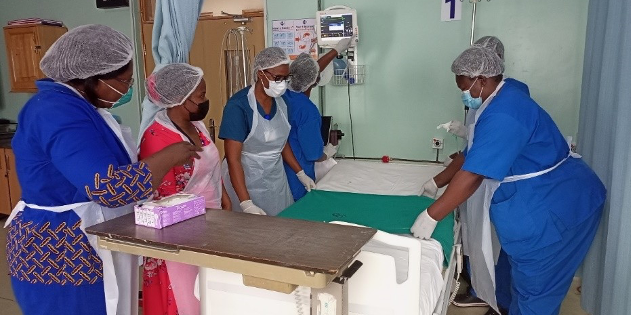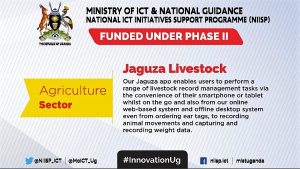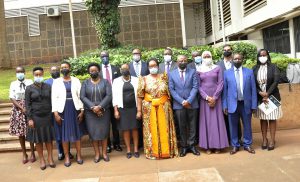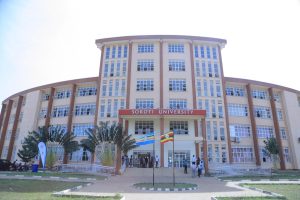In April 2020, Mbarara University of Science and Technology signed an agreement with the Ministry of Health to organize and conduct five month long Critical Care Training Program of 400 Nurses phased in 4 equal cohorts. This project has been timely with the challenge of the pandemic where critical care was in high demand. With the support from Uganda Reproductive Maternal Child Health Service improvement Project ( URMCHIP) project of the World Bank, through the Ministry of Health, it has been possible to train a cadre of core staff that will improve critical care and ICU Management in the country.
Dr. Grace Nambooze (PhD) from the Department of Nursing, Faculty of Medicine was contacted by the Ministry of Health, to write a concept on training of in- service intensive care nurses who can be deployed country wide to provide critical care nursing. The concept and workplan was approved. Dr. Nambooze was then appointed the National Coordinator in-service intensive critical care training programme in the entire country. From the Ministry of Health, Mr. Patrick Baruhagare, the Principal Human Resource Officer was appointed as the ministry coordinator of the project, to work closely with the National Coordinator to organize, plan and coordinate the entire programme. His office ensures that the ministry receives updates on the entire project, especially regarding intakes of each cohort, welfare, tuition fees sent to MUST on time).
The training aimed at:
- Equipping nurses with relevant knowledge, skills, attitudes, and competence required to work in Intensive Care Units.
- Promoting optimal use of ICU equipment and delivery of safe and quality care to the critically ill patients and their families using holistic approach
- Developing the capacity of the trainees to utilize technology for providing safe and quality care
So far 400 nurses have been trained country wide in 3 phases: Phase 1- face to face in BLS training 1 month; Phase 2 – hands on ICU training in Mulago National Referral Hospital to expose the trainees to well-equipped facilities; Phase 3 – go back to their home ICU and work with mentors, facilitators and other acdres in each facility such as Doctors, Nurses and Anesthesiologist in their own settings. This is hoped to build confidence for the trained persons to address any gaps that may arise. These have been supported by ICUs in: Mengo Hospital International Hospital Kampala, MEDI PAL Hospital, Kampala Hospital, Case Clinic Kampala, Nsambya Hospital, Nakasero Hospital ,Victoria Hospital, Heart Institute Mulago, Accident and Emergency Unit New Mulago, New Mulago ICU, Women Hospital Mulago, RubagaHospital,andNovikHospital.
On Behalf of MUST, Prof. Obua thanks URMCHIP project of the World Bank, for supporting this noble cause to impact Ugandans. He further thanked the Ministry of Health for support rendered in the training; to the MUST Faculty of Medicine, Department of Nursing Staff – you made MUST proud.
Other women from MUST who have made a difference in the different communities include:

Dr. Angella Musiimenta (PhD) from the Faculty of Computing and Informatics is the Principal Investigator of a project between Mbarara University of Science and Technology (MUST) in collaboration with MGH (USA), RAND Corporation (USA), Wisepill Technologies (South Africa), Angels Compassion (Uganda), and Istream (Uganda) has won a 5-year grant as My Mobile Wallet from the US National Institute of Health.
The aim is to see that the My Mobile Wallet project employs a mobile technology- based behavioral and economic intervention to support tuberculosis care and treatment adherence in Uganda. The project also includes research capacity building (a PhD sponsorship and short course trainings)
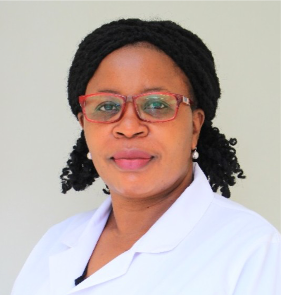
Dr. Scholastic Ashaba is a Senior Lecturer in the Department of Psychiatry, Faculty of Medicine with broad responsibilities for providing clinical services to psychiatric patients. Dr. Ashaba Scholastic is the Principal Investigator for an NIH Emerging Global Leader Award. With a Project Title: Self-Management among adolescents living with HIV in Uganda. Award, No: K43 TW011929-01,

Dr. Esther C. Atukunda wins NIH Grant
Dr. Esther won aR21 CFAR Admin Supplement grant from the US National Institutes of Health.
This CFAR Admin Supplement Explores how intersectional stigmas among MWH in Uganda contribute to poor HIV outcomes for men and HIV incidence among women of reproductive age.
This R21 CFAR Administrative Supplement was submitted in response to the request for projects on “Intersectional Stigma Effects on HIV Treatment, Prevention, and Care.”
The application was submitted with co-investigators from the University of Alabama at Birmingham, USA. Professor Celestino Obua, the Vice Chancellor, MUST, wishes all women a Happy Women’s Day and special recognition to all women who have made a difference in the lives of Ugandans in one way or another.

Dr. Elizabeth Kemigisha, a Pediatrician and lecturer Faculty of Interdisciplinary Studies, former MURTI fellow cohort 2018 to 2019 has been awarded a research Capacity Development grant funded by The World Academy of Science for the advancement of Science in developing countries, a UNESCO program unit (UNESCO- TWAS). This is a Seed Grant to New African Principal Investigators that intends to “Improve access to Sexual and Reproductive Health information and services for adolescents in Mbarara district in Southwestern Uganda (SG NAPI Agreement No.4500454082. This project aims at strengthening professional competencies of health workers in Mbarara to provide age-appropriate adolescent
friendly health services. This will be through training and establishment of a static adolescent health clinic at MRRH run by the department of pediatrics of MUST.

MUST was awarded a 10-year grant project funded by VLIR- UOS from Belgium. The project is to set the University as a facilitation for community based sustainable solutions to demographic challenges in South Western Uganda. Prof Grace Kagoro is to lead a project Title: Improved mechanism for Climate change adaptation for sustainable food production
It’s objectives are.
A) Establish climatic related hazards, risks, and vulnerabilities in farmer communities of five districts to inform policy interventions
B) optimize climate smart agricultural practices for adoption to upscale and diversify food production
C) optimize spatially collected data and analytical
capacities in soil and food profiling and plant micro- propagation of Mbarara University of Science and Technology
D) Develop farmer-led crop and climate monitoring systems for informed food production

